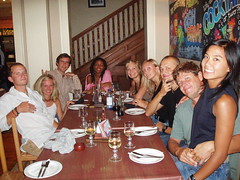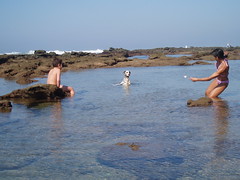"Small Things Count": a resource to those who approach their existence as a contribution to the world and how they live to making these initiatives happen in small or big ways.
Tuesday, May 23, 2006
The IMF Lecture
I've had a couple of pretty exciting lectures in Economic Development this past week. The most recent was from Cyrus Rustomjee, a former 4-year board member of the IMF (he represented 21 African countries) and 4 years as executive board member for South Africa with the World Bank. He really explained the functions of the IMF in Washington DC and the how the structure play for the 184 country member "shareholders", the 24 executive board members, and the 2000+ staff within the organization. The gist of the lecture dealt with the unequal balance of quotas (think of it as a credit union's shares) given to developing countries. Developing countries have 26% of the voting shares. Specifically for Africa, if we total the 45 African members out of 184 members, they only receive 4.4% of voting representation. Let's compare this to the US with 17% share and the EU with 32% share. Basically, if the developing countries wanted to affect policy or affect the decisions made in regards to the conditionalities for countries to receive a loan, they will really need to work hard to convince the industrialized countries of their needs. Secondly, the failure of certain debt relief programs such as the Highly Indebted Poor Countries (HIPC) have been partially due to developing countries not being heard at the meetings with their minority voting share. Cyrus did bring up a very good point that he has seen developing countries pull themselves together to be a viable state but he has also seen the opposite. There is also a responsibility on the country to have the political will to change.
Economics and HIV/AIDS

Busy bee. that is me. I have made a list of things to do and it does not seem to come to an end. I've given up on my quest to find travel funds to attend the Toronto International AIDS Conference because I'm way too busy to start writing letters to Canadian funders, the embassy and all that hassle. It is the same time that I'll hopefully be doing my field work so I'll take this as an opportunity to do my best local research. Many conferences to come. The main reason I would have liked to attend is to find out how the world is economically dealing with the epidemic through the business value chain and how HIV/AIDS is affecting market development in some of the hard hit areas. If you have a whole population of 18-45 year olds, the most productive in your population, being wiped out by a disease, how do you start to market or create products that fit the needs of young people and the elderly? In the microfinance sense, what kind of reseach is being done for an alternative niche market who are may be dependent on social transfers and pensions to take care of their grandchildren whose parents have passed away from the epidemic?
Treatment is on its way but I think it is critical to start to think about how a business must adjust to the changes from a decrease in your labour force and lower productivity from illness. What kind of policies are being put in place to lessen discrimination for those individuals? Well, I have found a place to start my research at a place called HEARD (Health Economics and Research Division) here at UKZN. The Director, Alan Whiteside, has had some articles on the effects of HIV/AIDs on the labour force.
Other stuff on HIV/AIDS in Southern Africa course, we had to form groups and on June 15, do a presentation on any topic. Our group has decided to do the following "How to achieve adherence to ARV treatment?" Dude where do you start on something like this? Well, my group is made up of two demographers, two nurses, one AIDS counsellor/nurse and me, the economics person. We've already brainstormed on how people do not follow treatment because they do not take it seriously enough, the stigma, denial from the individual, family and workplace, the need to work (can't miss work for a treatment), the list goes on.
Hein Marais article in the Mail & Guardian SA: "A plagus of inequality". "Aids is meshing with the routine distress endured by millions of South Africans"
Friday, May 19, 2006
Durban International Film Festival 2006
The UKZN Centre for Creative Arts (CCA) hosts the Durban International Film Festival 2006 from June 14-25. The link below leads you to the current list of films and documentaries which will be shown at the fest. Wavescape will also be host to a surf film festival at the same time as the DIFF. You can catch me at both.
http://www.ukzn.ac.za/cca/DIFF_2006.htm
http://www.ukzn.ac.za/cca/DIFF_2006.htm
Worker's Strike in South Africa
Yesterday, the national unions (Cosatu - Congress of South African Trade Unions) conducted a strike nationwide against low wages, worker's rights, and encouraging the government to create jobs. There has been strong support in all sectors and by civil society to improve the conditions for workers. The disruption has been effective as people have no transport to get to work and locals have sentiments for those paid less than 30R a day ($4 CAD) to feed their families. There is a large class division among the population for the haves and the have-nots which has trickled through history since the apartheid era.
Thursday, May 18, 2006
Nkosi Johnson (age 12) – South African AIDS Activist
Nkosi Johnson (age 12) – South African AIDS Activist
He was the world’s longest surviving HIV+ baby.
Yesterday was the start of my course called “HIV/AIDS in Southern Africa” taught by Eleanor Preston-Whyte. Since starting my classes in February, I have only been surrounded by social science students in Development and Population studies. In this course, there is an even mix of clinical/medical students, nurses, one doctor, social science students and some exchange studies from the U.S. and Canada. I think this will make for interesting perspectives on this course. Prof. Preston-Whyte went over a timeline of HIV/AIDs in both an international and South African context. In 1979, the first case of AIDs was found in New York. We had a brief overview of the different drugs and scandals that have come along with the drugs. We were asked to research the difficulties of the recording the prevalence of AIDs in South Africa. The range is any where from 24% - 30%. We also quickly reviewed some key organizations which are making breakthroughs in recognizing the epidemic like the Treatment Action Campaign (TAC) and the dissidents of the disease including Mbeki and the Ministry of Health’s continuous decision to downplay the extent of the devastation of AIDS.
FYI - The 2006 International AIDS Conference will be taking place in Toronto in August 2006.
Article in Time Magazine - when Silence Kills July 2004.
He was the world’s longest surviving HIV+ baby.
Yesterday was the start of my course called “HIV/AIDS in Southern Africa” taught by Eleanor Preston-Whyte. Since starting my classes in February, I have only been surrounded by social science students in Development and Population studies. In this course, there is an even mix of clinical/medical students, nurses, one doctor, social science students and some exchange studies from the U.S. and Canada. I think this will make for interesting perspectives on this course. Prof. Preston-Whyte went over a timeline of HIV/AIDs in both an international and South African context. In 1979, the first case of AIDs was found in New York. We had a brief overview of the different drugs and scandals that have come along with the drugs. We were asked to research the difficulties of the recording the prevalence of AIDs in South Africa. The range is any where from 24% - 30%. We also quickly reviewed some key organizations which are making breakthroughs in recognizing the epidemic like the Treatment Action Campaign (TAC) and the dissidents of the disease including Mbeki and the Ministry of Health’s continuous decision to downplay the extent of the devastation of AIDS.
FYI - The 2006 International AIDS Conference will be taking place in Toronto in August 2006.
Article in Time Magazine - when Silence Kills July 2004.
Wednesday, May 17, 2006
Case Study on the WTO and Bananas
Yesterday (and today) I've been working on a case study about the WTO and Bananas. We had to use two articles: one from Oxfam and another from Scott Barfield - "Multilateral Agreement on an EU Banana Trade Regime - A Political Compromise".
It's been interesting trying to understand all sides of the debate on whether the WTO is doing its job in opening the world to free trade but at the same time assisting with development for underdeveloped countries.
It's been interesting trying to understand all sides of the debate on whether the WTO is doing its job in opening the world to free trade but at the same time assisting with development for underdeveloped countries.
Monday, May 15, 2006
Perogies at 3 Beaumont Road
Another nice sunny weekend on the Bluff. I went for a run on Saturday and Sunday along the beach with two borrowed dogs, Jumpy and Crash. I also made around eight dozen pieces of perogies. Why do you ask? They do not sell them at any of the big supermarket shops and I didn’t know what I was committing to until I noticed 7 cups of flour was involved halfway into the process. Needless to say, they are delicious and I won’t be denied of any Ukrainian cravings.
“The most potent weapon in the hands of the oppressor is the mind of the oppressed.” Steve Biko.
Today, I met with my Research Methods II group to discuss what we will do for our qualitative research – case study. It looks like we are hoping to focus our study on South Africa’s move towards the corporatization of tertiary education. Some of our ideas include: The access of education for disadvantaged students is decreased when considering profit and students as customers. The market friendly approach allows only those who are able to afford education to attend. The market transfers costs of education to families, private donors and sponsors to pay for education. Since globalization is driven towards increasing information and pushing market agendas, universities are only focusing on these international needs of technology and business. Even in the integrated world, there is a lack of women in these globalized programs such as technology, science and engineering.
Our Rationale (this is mainly our brainstorming for today):
University education is intended to be a public good. The government is supposed to build their human capital under conditions of a free and creative mind. Those educated under the system are anticipated to use their skills and innovation to become productive contributors to society and lead the country to economic growth and social equality. However, current realities for universities in developing countries are undermining equal opportunities and the freedom to decide on important research and teaching. Under strict conditions by international financial institutions (IFIs), governments are forced to ensure that their government fiscal deficits are low and therefore government must ensure that their public spending in public education is under their actual revenue received. Generally, deficits will lead to less public spending and therefore costs are transferred to students through higher tuition. Students and universities are dependent on private donors and alumni to sponsor the operation of the school which can lead to implications on certain aspects of chosen research or decision on career selection for students. The same principles apply to bursaries and scholarships and the increasingly competitive process. Developing countries, specifically, are trying to establish democracy and equality within their own societies and use universities as a starting point and model to address public interests for the country. There could be a direct relationship between the operation of the university and the development of the nation. Universities can end up with a narrow focus on economics and market principles and countries can deny the study of culture. It is important for universities to encourage the diversification of degrees. To fully develop as a developing country, increase equity of opportunity for all. Corporatization affects equity of education. It is important that the university, within this globalized environment, ensures that education is focused on promoting access to disadvantaged students and that females are encouraged to enter programmes which are priorities within the country. Internationally, the World Trade Organization (WTO) has been looking at proposals of making education a tradable commodity. It is important to follow these trends as it could lead to the disintegration of national tertiary education programs as developed countries attempt to deliver “branch” universities in developing countries.
“The most potent weapon in the hands of the oppressor is the mind of the oppressed.” Steve Biko.
Today, I met with my Research Methods II group to discuss what we will do for our qualitative research – case study. It looks like we are hoping to focus our study on South Africa’s move towards the corporatization of tertiary education. Some of our ideas include: The access of education for disadvantaged students is decreased when considering profit and students as customers. The market friendly approach allows only those who are able to afford education to attend. The market transfers costs of education to families, private donors and sponsors to pay for education. Since globalization is driven towards increasing information and pushing market agendas, universities are only focusing on these international needs of technology and business. Even in the integrated world, there is a lack of women in these globalized programs such as technology, science and engineering.
Our Rationale (this is mainly our brainstorming for today):
University education is intended to be a public good. The government is supposed to build their human capital under conditions of a free and creative mind. Those educated under the system are anticipated to use their skills and innovation to become productive contributors to society and lead the country to economic growth and social equality. However, current realities for universities in developing countries are undermining equal opportunities and the freedom to decide on important research and teaching. Under strict conditions by international financial institutions (IFIs), governments are forced to ensure that their government fiscal deficits are low and therefore government must ensure that their public spending in public education is under their actual revenue received. Generally, deficits will lead to less public spending and therefore costs are transferred to students through higher tuition. Students and universities are dependent on private donors and alumni to sponsor the operation of the school which can lead to implications on certain aspects of chosen research or decision on career selection for students. The same principles apply to bursaries and scholarships and the increasingly competitive process. Developing countries, specifically, are trying to establish democracy and equality within their own societies and use universities as a starting point and model to address public interests for the country. There could be a direct relationship between the operation of the university and the development of the nation. Universities can end up with a narrow focus on economics and market principles and countries can deny the study of culture. It is important for universities to encourage the diversification of degrees. To fully develop as a developing country, increase equity of opportunity for all. Corporatization affects equity of education. It is important that the university, within this globalized environment, ensures that education is focused on promoting access to disadvantaged students and that females are encouraged to enter programmes which are priorities within the country. Internationally, the World Trade Organization (WTO) has been looking at proposals of making education a tradable commodity. It is important to follow these trends as it could lead to the disintegration of national tertiary education programs as developed countries attempt to deliver “branch” universities in developing countries.
Friday, May 12, 2006
Central Banks roles in Developing Countries
Excellent, another weekend, another stack of journals to read! Yesterday I spent my whole day trying to understand the functions of the central bank and why is it important for developing countries. First of all, why would a regular person even be interested in the central bank? Well, mainly because they can have the power to control whether the price of your toothpaste, tomato or baking powder goes up or whether they become part of a government’s employment strategy. For developing countries, it is necessary to establish a competent central bank under difficult circumstances of financial system sophistication and resources. The main discussion on central banks are whether they should or should not be independent from the actual government. Some say they should be part of government since they are the elected body who should make decisions according to the citizen's needs. Others say that independence is necessary to create credibility with international financial markets on unbias, economically sound decisions. I think that there should be a combination of both the central bank working together with government to understand the reasons behind their decisions on increases/decreases of money supply but that contracts are built with both parties in accordance to the objectives of the society.
Wednesday, May 10, 2006
African Sugar Association
Close friend of mine has started her project with Sugar Ethique in Paris. It is a lobby group assisting African countries promote their sugar trade now that the WTO has set an injunction against the European Union and their unfair subsidy program on European sugar.
Monday, May 08, 2006
Gender Relations in Economics
Our recent seminar was about gender issues in economics, at first thought a strange topic for discussion. However, in developing countries, poor families are affected by the economic policies adopted by their governments. For example, when a country must adopt strict conditions of decreased government spending on health care or decide to privatize hospitals, women are affected. General child rearing is still conducted by mothers or grandmothers and the costs saved from the government are actually transferring burdens on those who now must spend more time at home when a child is ill. Higher costs from hospital fees or hospital staff recommending more home care can be economically draining to families who already have small incomes for food and now must sacrifice work time or money to the sick. Women in households must absorb the shocks of these economic policies.
In many underdeveloped countries, women are still doing most of the housework unpaid. Their contributions assist in building a healthy, educated productive class for economic growth, an important factor for governments. However, when households are overburdened with higher food prices and cost of living, coping and survival become crucial in avoiding deeper poverty and less opportunities for their children.
In many underdeveloped countries, women are still doing most of the housework unpaid. Their contributions assist in building a healthy, educated productive class for economic growth, an important factor for governments. However, when households are overburdened with higher food prices and cost of living, coping and survival become crucial in avoiding deeper poverty and less opportunities for their children.
Boycott the Canadian Census?
I just received this disturbing email about the company who has been contracted out to conduct our 2006 Canadian Census. The letter and website from vivelecanada.ca explains how Lockheed Martin, a major US weapons contractor, has been chosen, due to the software and data collection, to gain an insight to the lives of the Canadian people. Take it as you like it if you wish to participate in their letter writing campaign to your PM or MP. I personally still believe in the right to protect our private information from being contracted to companies that are against the values of the Canadian people and who are not working towards peace worldwide.
Friday, May 05, 2006
Simply Fish Birthday Dinner
Last night, I shared my birthday with one of my classmates, Lauren (2nd from the left), at a fish/sushi restaurant called Simply Fish. It's located on the popular street called Florida Road and the set up reminded me of Seattle's Pier fish market (because of the chalkboard signs) come the colonial times. The sushi was surprisingly good and the company made the night full of laughs and conversations. Ayanda, (4th from left) told us about her job here in Durban. She is a training coordinator for the city to get the traditional leaders or the "amakosi" to adapt their rule with current constitutional democratic rule of law. In Durban there are 17 amakosi. These 17 individuals are then ruled under the king called the "Goodwill". Traditional leaders are important to the democratic process because during apartheid, they were mainly responsible for communicating with the population. The rural communities listen to these leaders and therefore a mutual understanding between both the ANC and traditions would be beneficial for effective government. There is the argument that the traditional leaders are offered stock options and free computers which is not cohesive to democratic rule. However, which leaders today do not have their hands in certain industries and business and have the capability to run their electoral office without a computer? I am sure monarchy and rule by lineages will fade with evolution of politics, but there should also be a second thought when accusing these traditional leaders of corruption without looking at our own leaders and their personal agendas.
Thursday, May 04, 2006
Folk Club: Syd Kitchen
Thanks for the early morning wake up call, ladies! Just a quick update from last Tuesday night Folk night hosted at the Jazz Centre at UKZN. There was this guy named Syd Kitchen who played unbelievable guitar, and spoke like soap had never touched his mouth before. A must see in Durban if you get the chance. This morning, I had a huge bacon and egg breakfast which reminded me of home. and tonight I shall dine at Durban's few sushi restaurants called Simply Fish. I'll let you know if it is even comparable to Vancouver.
Tuesday, May 02, 2006
skipping shells with Riley
It's been a lovely last three days before the start of the quarter. Sunny beach weather saw me swimming in the rock pools, skipping rocks and shells with the dalmatian, Riley and staring at all the little tiger fish, black tails and sponges on the coral reef. Tough life.
3 month reflection
I can’t believe that I have been in Durban for three months. Reflecting back to my arrival here in South Africa, I had several objectives in mind: a) understand more about development from an African perspective, b) finish a Masters with a dissertation on microfinance and c) surf loads.
From this first quarter, I felt the learning that I gained from every lecture was at least 3 undergraduate degrees in itself. African studies, economics and politics all rolled up into three months. In that, the courses have been well worth the effort of scrapping together the student visa, and forking out the tuition and plane ticket to go. I’m not there yet though. I’m still aiming to complete this degree in one year so I think this term will be used to start part b) of my studies. The last two days have been devoted to preparing for our research proposals and finding a good supervisor. And my final objective has been wavering a bit the last two weeks. I have been trucking through the last two papers with little water or exercise time. Back on the circuit and on to some waves. Today was a huge off shore swell which I prefer to sit back and observe versus going out and being pummeled. However, it’s time to get back in the water.
From this first quarter, I felt the learning that I gained from every lecture was at least 3 undergraduate degrees in itself. African studies, economics and politics all rolled up into three months. In that, the courses have been well worth the effort of scrapping together the student visa, and forking out the tuition and plane ticket to go. I’m not there yet though. I’m still aiming to complete this degree in one year so I think this term will be used to start part b) of my studies. The last two days have been devoted to preparing for our research proposals and finding a good supervisor. And my final objective has been wavering a bit the last two weeks. I have been trucking through the last two papers with little water or exercise time. Back on the circuit and on to some waves. Today was a huge off shore swell which I prefer to sit back and observe versus going out and being pummeled. However, it’s time to get back in the water.
Subscribe to:
Comments (Atom)





